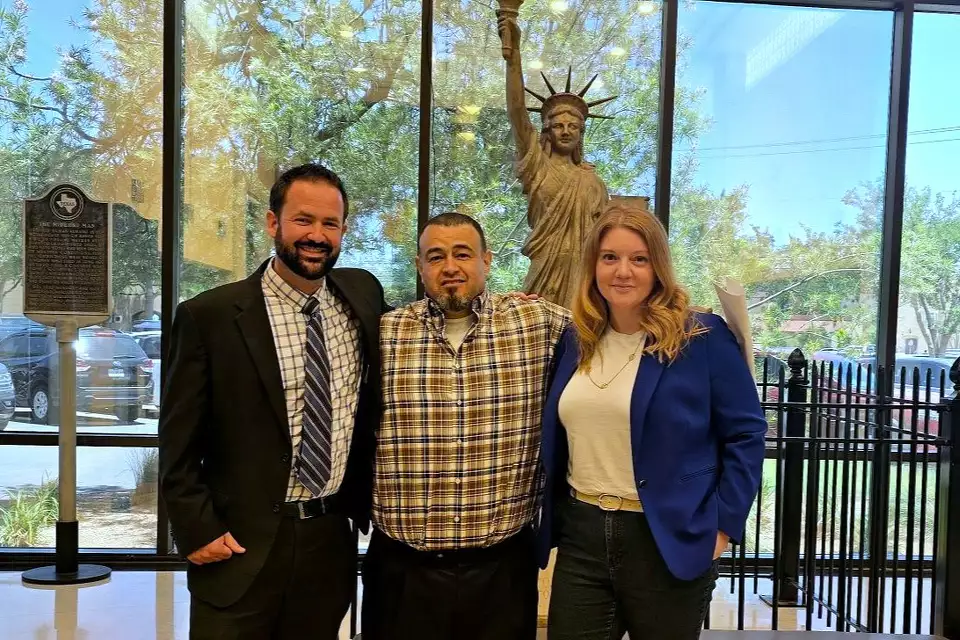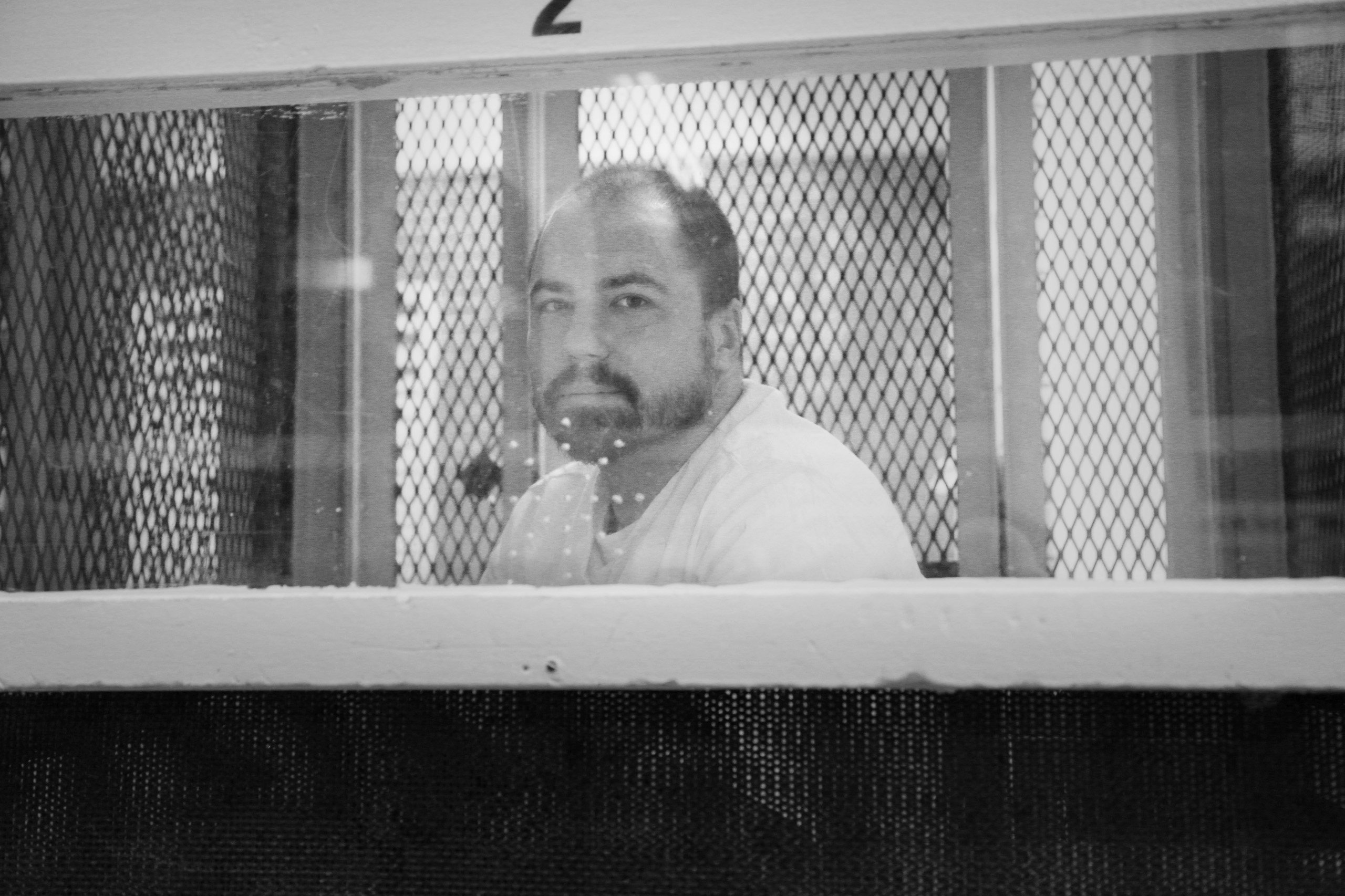Samuel Junior Sanchez had served around 15 years of a 75-year sentence for a violent road-rage incident and had seemingly exhausted all appeals when his sister contacted a group of Abilene attorneys in 2021 about new information she hoped might finally give her brother another chance at life.
As an angry young man, Sanchez had chased down and shot at a car whose driver honked at him, resulting in the injury and permanent paralysis of a passenger and Sanchez’s indictment for aggravated assault with a deadly weapon in 2006. But Sanchez was now in his 50s, and he’d radically changed in prison. Though he never expected to live long enough to win release, he’d been keeping journals and dedicating himself for a decade to daily bible study, prayer, and counseling younger men to avoid prison gangs and violent behavior.
Sanchez was among about 300 criminal defendants who’d received notice that they’d been affected by a nationally publicized misconduct scandal, described blandly by the Midland County District Attorney’s office in a form letter as an “ethical situation.” During Sanchez’s trial—and during his initial unsuccessful appeal—a Midland County assistant district attorney named Ralph Petty simultaneously worked as a paid law clerk for the judges overseeing his and other cases, while concealing that double role from defense attorneys.
 Samuel Sanchez (center) with attorneys Jacob Blizzard and Sarah Durham (Courtesy/Blizzard & Zimmerman)
Samuel Sanchez (center) with attorneys Jacob Blizzard and Sarah Durham (Courtesy/Blizzard & Zimmerman)In 2021, the moonlighting Midland prosecutor’s shocking misconduct made national news because of his participation in the case of a death row inmate named Clinton Young. During Young’s appeal, Laura Nodolf, then Midland County’s elected district attorney, unearthed evidence that Petty, by then a retired assistant district attorney, had clerked after hours for years. Nodolf disclosed this to Young’s attorneys, and investigative reporter Jessica Priest broke the story for USA Today. As a result, Young’s conviction and death sentence were reversed in September 2021. (Young spent a peaceful, though brief, period out on bail before being retried and resentenced to life.)
On June 12, Sanchez left the courtroom as a free man, following a plea deal that was negotiated after the Texas Court of Criminal Appeals (CCA) reversed both his aggravated assault conviction and sentence because of Petty’s misconduct. Sanchez’ court victory came due to the support of relatives who scraped up funds for his representation by Blizzard & Zimmerman, an Abilene criminal defense firm, which spent nearly four years pursuing his appeal and negotiating his release.
Surrounded by about 30 family members and friends, Sanchez stood speechless in court when the judge approved a new conviction and sentence for time served—meaning he could go home. “He just cried,” Jacob Blizzard, one of Sanchez’ criminal defense attorneys told the Texas Observer. “He was just overwhelmed with emotion.”
So far, at least four men—Young, Sanchez, and two others—have had their felony convictions and sentences tossed by the conservative CCA based on evidence that Petty’s misconduct violated their rights to a fair trial and an unbiased judge, court records show. Sanchez appears to be the first freed on a plea deal.
“I think that what’s so egregious is how systematic it was,” Blizzard said. Petty “did it over and over again for pretty much all of the judges but at the same time I think kept it secret.”
In April 2021, Petty was forced to resign from the Texas Bar after the state Supreme Court found his misconduct was “conclusively established.” Still, he submitted an affidavit in 2023 opposing relief for Sanchez.
Many more Midland criminal defendants remain, some imprisoned, who were affected by Petty’s long-term misbehavior, and “dozens and dozens” of cases remain to be addressed, Midland District Attorney Glenn Harwood told the Observer.
In an opinion in another case, CCA Judge Bert Richardson echoed a Fifth Circuit court judge’s description of the situation as “utterly bonkers.”
Richardson continued: “Our adversarial system of law before an impartial judge malfunctioned. The barrier to prevent ex parte communications between the prosecutor and the neutral judge vanished (unknown to the defense). This situation leaves ‘lasting stains on a system of justice’ that will take years to restore.”
Petty had played a dual role as prosecutor and judicial clerk in Midland County from about 2001 until his retirement in 2019, records show—often performing both duties on the same cases and even drafting judicial orders in response to motions he’d filed as a prosecutor. Though Nodolf said she didn’t learn of his clerking for judges until August 2019, when she disclosed it, court records show two former elected district attorneys concealed his moonlighting and many local judges participated. (It’s unclear whether other players in Midland besides Petty will face any consequences for their roles in his misconduct.)
After being hired by Sanchez’ relatives in 2021, Blizzard and his associates spent nearly two years digging into Petty’s part in Sanchez’ conviction and 75-year sentence. In all cases tainted by Petty’s moonlighting, the burden remains on the defendants to prove that Petty’s tenure as a judicial clerk overlapped with his participation in their cases as a prosecutor and also caused a violation of their constitutional rights.
Attorneys dug through old billings and court files and found what they considered clear evidence that Sanchez’s rights had been violated. Their 2023 appeal calculated that Petty had made at least $271,850 moonlighting as a law clerk, while earning a full-time salary from the county as assistant DA. Petty played his double role during Sanchez’ 2007 trial, and, in 2016, Petty was “paid by the trial court to dispense” with Sanchez’ first habeas application while he “also opposed the application as a prosecutor,” per the appellate record.
Sanchez’s Abilene attorneys also found court-issued documents resembling Petty’s writing style—bearing the unusual fonts and asterisks he favored—coinciding with Petty’s arguments to the judge to deny Sanchez’s appeal.
Petty had clearly been “in the decision-maker’s secret ear to help them make decisions about the case,” Blizzard told the Observer.
 Clinton Young in a prison visitation booth earlier this year (Michelle Pitcher)
Clinton Young in a prison visitation booth earlier this year (Michelle Pitcher)Still, Blizzard’s firm’s initial efforts to challenge Sanchez’ conviction ended with an unpublished CCA ruling—in 2023, one year prior to the court’s ultimate reversal—that Sanchez’s constitutional rights had not been violated. Meanwhile, unbeknownst to them, lawyers in other parts of Texas were filing other appeals that challenged the prosecutor’s dual role in their clients’ cases.
One appeal that made its way to the CCA sought relief for Michael David Lewis, who’d been sentenced to life without parole for capital murder. Another was separately filed for Mohsin Mazhar Syed, who’d been convicted of sexual assault. Both cases overlapped with Petty’s moonlighting years.
In Ex Parte Lewis, handed down in May 2024, the CCA strongly condemned Petty and the judges who employed him. “The undisputed facts establish that the trial court allowed his paid judicial law clerk to represent one of the parties appearing before him in a contested legal matter. This undisclosed employment relationship between the trial judge and the prosecutor appearing before him tainted Applicant’s trial,” the court ruled.
Lewis was resentenced to 30 years in prison. Syed and Sanchez subsequently won reversal of their convictions and sentences under the Lewis decision. In both cases, the CCA issued new opinions, reversing their prior denials.
Nodolf had recused her office from handling any appeals based on Petty’s misconduct after discovering it in 2019; she didn’t seek re-election in 2024. Harwood, a former state and federal prosecutor who took office on January 1, has inherited the aftermath.
“The whole Ralph Petty thing is just a big old mess, and we’re doing our best,” he told the Observer. In some cases, it takes research to determine whether Petty was involved. What course Harwood takes in each depends in part on the details of Petty’s actions.
“Some we can’t retry. Some we can come to an agreed resolution—that’s not necessarily satisfactory,” Harwood said. “And there’s the cases where we can retry, like Clinton Young’s, and that’s what we’re going to do.”
The post Moonlighting Midland Prosecutor Means Freedom for Samuel Sanchez appeared first on The Texas Observer.
 (2).png)
 5 months ago
246
5 months ago
246





 English (US)
English (US)